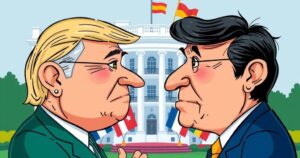Suriname Votes for New Government Amid Oil Wealth Prospects

Suriname’s parliamentary elections began on Sunday, aiming to elect leaders who will manage the country’s emerging oil wealth. Incumbent President Chan Santokhi looks to secure a second term amidst economic challenges. With significant offshore oil discoveries on the horizon, the new government will have the opportunity to change the nation’s financial landscape.
Suriname commenced its parliamentary elections on Sunday, a pivotal moment as citizens articulate their preferences for a new government that will oversee the management of significant oil wealth. This wealth has the potential to transform the nation, which is the smallest in South America and has Dutch as its official language.
The country currently grapples with issues like high debt, soaring inflation, and poverty that impacts nearly 20% of its 600,000 residents. However, recent offshore oil discoveries provide a glimmer of hope for improvement. “It will be a huge amount of income for the country,” stated incumbent President Chan Santokhi, as he emphasized the potential to better the lives of citizens amid these economic challenges.
The election involves selecting a new parliament consisting of 51 members. This assembly is tasked with choosing a president and vice-president within weeks, who will serve a five-year term. Notably, Santokhi is eligible for re-election. But, without any party holding a distinct lead, it’s tough to forecast the outcome.
Defence Minister Krishna Matheora underscored the importance of securing a win for Santokhi’s Progressive Reform Party (VHP). After casting his vote, he remarked, “We have laid the foundations for economic stability and we need to build on that.” The new leadership will have an opportunity to effect substantive changes in Suriname’s financial landscape, particularly as experts predict a sizeable influx of revenue from the newly discovered offshore oil resources.
In a notable project, French company TotalEnergies announced last year a $10.5 billion initiative aimed at developing an oil field offshore, with an anticipated production capacity of 220,000 barrels per day. Initial production is slated for 2028, and the country plans to establish a “Royalties for Everyone” fund to ensure that citizens benefit directly from the expected financial boom.
This election features 14 parties contending for parliamentary seats, including Santokhi’s VHP and the leftist National Democratic Party (NDP), associated with the late Desi Bouterse. The Vice President, Ronnie Brunswijk, leads the center-left General Liberation and Development Party (ABOP), which carries its own historical significance.
While provisional election results are anticipated by late Sunday, the political landscape emphasizes Suriname’s diverse cultural heritage, reflective of its Indian, Indonesian, Chinese, Dutch, Indigenous, and African roots. As this November marks the country’s 50th independence anniversary, Suriname’s relationships, particularly with China, are also gaining attention. The nation has aligned itself closely with China as a crucial trading partner since joining the Belt and Road Initiative in 2019.
Moreover, U.S. Secretary of State Marco Rubio’s brief visit to Suriname earlier this year highlighted American interests in countering China’s influence in the region. With more than 90% of Suriname covered with forests, it stands out with a negative carbon footprint. Santokhi asserts that this environmental status remains secure, claiming that the oil windfall will facilitate a pivot toward greener energy, stating, “It will be gone after 40 years,” referring to fossil fuels.
As Suriname heads into new parliamentary elections, the outcomes will be critical in determining how the nation will leverage its newfound oil wealth. With pressing economic challenges and a rich cultural diversity, citizens are casting their votes amid expectations of potential transformation. The political scene remains dynamic, with various parties vying for power, while international relations play a key role in the nation’s future advancements. Ultimately, the direction taken by the new government will resonate for generations to come.
Original Source: www.rfi.fr





